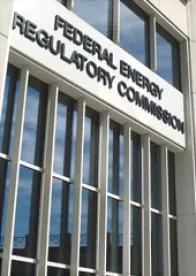On January 27, 2016, TOTAL Gas & Power North America, Inc. (“TGPNA”) and two natural gas traders filed a complaint for declaratory relief in the U.S. District Court for the Western District of Texas against the Federal Energy Regulatory Commission (“FERC”) claiming that FERC intends to violate TGPNA’s statutory and constitutional rights by proceeding with an administrative enforcement action against the company for alleged violations of the Natural Gas Act’s (“NGA”) prohibition on market manipulation.[1] TGPNA’s complaint represents a direct attack on the legality of FERC’s existing enforcement processes and, if granted, could result in significant changes to the manner in which FERC investigates and prosecutes allegations of market manipulation and other regulatory violations.
In the complaint, TGPNA requests that the court find that the NGA and U.S. Constitution confer a right to a full jury trial in any action where FERC seeks to assess civil penalties for an alleged violation of the NGA or the Commission’s rules or regulations. TGPNA alleges that FERC has routinely deprived companies of these rights by subjecting entities accused of violating the NGA to a biased investigatory and adjudicatory process in which FERC functions as prosecutor, judge, and jury, with extensive off-the-record communications between the commissioners and its staff and a largely irrebutable presumption of guilt for the accused. TGPNA claims that FERC routinely assesses penalties under the NGA without affording entities an opportunity to a trial-type evidentiary hearing. To the extent that such a hearing occurs, it is held before a FERC Administrative Law Judge (“ALJ”), who is not bound by the procedural requirements that typically characterize court proceedings and uniformly side with the agency. Such a process, TGPNA maintains, is fundamentally inconsistent with Congress’s decision to vest federal district courts with exclusive jurisdiction over violations of the NGA and denies the accused’s right to a jury trial before an impartial tribunal in violation of Article III and the Fifth and Seventh Amendments to the Constitution. TGPNA adds that, even if that were not the case, setting matters for hearing before an ALJ violates the Appointments Clause of the Constitution because FERC ALJs are improperly appointed by the FERC Chairman—rather than by the Commission acting as a whole—as required.
TGPNA’s complaint raises a host of issues that cut to the very core of FERC’s existing enforcement structure. As an initial matter, TGPNA seeks to overturn FERC’s determination in a 2006 “Statement of Administrative Policy Regarding the Process for Assessing Civil Penalties” (“2006 Policy Statement”) that the NGA—unlike the Federal Power Act (“FPA”)—does not confer a right to obtain de novo review of FERC’s penalty assessments in district court. While the FPA expressly affords parties the right to choose between a hearing before an ALJ prior to an assessment of penalties by FERC or an immediate assessment of penalties followed by de novo review in federal district court, the NGA merely states that any “penalty shall be assessed by the Commission after notice and opportunity for public hearing.” In the 2006 Policy Statement, FERC found that the lack of a reference to de novo review in the NGA means that no such process is required, with FERC free to simply assess penalties or set the case for hearing before an ALJ after giving the target of an investigation an opportunity to respond to the Office of Enforcement’s allegations. As a practical matter, this means that the only recourse available to a person seeking to challenge an assessment of a penalty under the NGA is to seek appeal of FERC’s order assessing a civil penalty in a U.S. Court of Appeals. Although FERC has taken a decidedly narrow view of the scope of de novo review under even the FPA in the Barclays and Powhatan cases, TGPNA maintains that FERC’s policy negates an important protection for those accused of violating the NGA.
TGPNA’s complaint also represents a direct attack on the fairness of the existing administrative structure FERC uses to evaluate and assess penalties for claims of market manipulation and other wrongdoing. In effect, TGPNA is arguing that it is impossible for an accused to obtain an impartial hearing at any point in the process, with the commissioners and advisory staff participating actively in any investigation and then ruling on the merits of the Office of Enforcement’s allegations and proposed penalty.
The complaint also is the most recent challenge to the constitutionality of the process used to appoint ALJs by federal agencies. Over the past year, similar challenges have been launched by a number of entities that have found themselves subject to enforcement actions involving the Securities and Exchange Commission (“SEC”). As a general matter, these entities have argued that ALJs are “inferior officers” under Article II of the Constitution that must be appointed by the President, a court of law, or a “Head of Department,” which, for purposes of a federal commission that has multiple members, means the commission acting collectively as opposed to any member acting alone. A number of courts have agreed that the manner in which the SEC appoints its judges is “likely unconstitutional” and have granted stays of SEC proceedings to afford time for litigation concerning the constitutional question to proceed.
Coming at a time when FERC is already involved in an unprecedented amount of litigation involving the scope of FERC’s prohibition on market manipulation and the limits of FERC’s authority thereunder, TGPNA’s complaint serves to cast further uncertainty over FERC’s enforcement authority. Should TGPNA prevail, all respondents, whether they were accused of violating the NGA or FPA, would have a right to a trial in federal district court. In contrast to the current process, once FERC’s investigation determined that there was a basis for a claim and had identified a proposed penalty, FERC would be required to proceed to district court to affirmatively prove that the respondent had violated the statute as alleged. In addition, even if the court dismissed TGPNA’s claims regarding the right to a trial in district court, FERC may have to restructure its ALJ program such that the entire Commission must approve the hiring of an ALJ, not just the Chairman. If that occurs, the recent ALJ decision in the BP case may be called into question. With the filing of TGPNA’s complaint and the existing court actions involving Powhatan and other companies, there is little doubt that the coming months and years will prove formative in the development of FERC’s enforcement authority.
[1] TGPNA and its employees are currently under investigation by FERC for alleged manipulation of the price of natural gas and recently entered into a settlement with the Commodities Futures Trading Commission (“CFTC”) addressing similar allegations. More information about TGPNA’s settlement with the CFTC can be found here.






 />i
/>i
